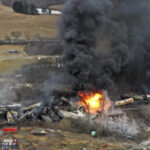Federal safety investigators on Friday faulted pilots who tried to outrun approaching storms in two fatal medical helicopter crashes in South Carolina and Tennessee.
The National Transportation Safety Board issued very similar findings in both crashes, saying the pilots could have made safer decisions, but risked flying into bad weather in order to return home. Two pilots and four flight nurses were killed in the 2009 and 2010 crashes.
The board studied an increase in crashes involving medical helicopters between 2002 and 2005 and said there were recurring safety issues, including a lack of flight risk evaluations and less stringent requirements for flights without patients on board.
In the September 2009 crash in South Carolina, the NTSB said the Texas company that operated the medical helicopter, OmniFlight, contributed to the crash because it did not have a formalized dispatch system that required its pilots to check in with dispatchers before taking off. OmniFlight did not immediately return a phone call seeking comment Friday.
The system could have helped the pilot realize there were storms between the Charleston hospital where he dropped off the patient and the helicopter’s home base in Conway, the safety board said in a report on the accident.
Pilot Patrick Walters, 45, flight nurse Diana Conner, 42 and paramedic Randolph Claxton Dove, 39, died in the crash. Walters likely became confused by low clouds and stormy conditions and lost control of his helicopter, the NTSB said.
“The pilot did not have to enter the weather and could have returned to Charleston Air Force Base/International Airport or landed at an alternate location. The pilot, however, chose to enter the area of weather, despite the availability of safer options,” the safety board said.
In the March 2010 crash in Tennessee, the NTSB said the pilot was finishing a 12-hour night shift and told another pilot he thought he had about 18 minutes to beat a storm moving into the area and return to his home base in Brownsville, which is about 55 miles northeast of Memphis.
Pilot Doug Phillips told the other pilot that he “wanted to get the helicopter out” and was going to leave the flight nurses behind. But they returned to the helicopter before he was able to leave the hospital.
On its return trip, the helicopter likely ran into the leading edge of the storm, which included heavy rain, lightning and wind gusts up to 20 knots. Phillips, 58, of Bartlett, Tenn.; nurse Misty Brogdon, 36, of Jackson, Tenn.; and nurse Cindy Parker, 48, of Dyersburg, Tenn., were killed in the crash. The report said there was no evidence that the helicopter was struck by lightning before it crashed.
“Based on these conditions, the helicopter likely encountered severe turbulence from which there was no possibility of recovery, particularly at a low level,” the report said.
The report noted that while the helicopter ran into bad weather, the crash wouldn’t have happened if the pilot had chosen to remain at the hospital. Representatives for Hospital Wing, the Memphis-based company that operated the helicopter, did not immediately return a phone call seeking comment Friday.
“The pilot made a risky decision to attempt to outrun the storm in night conditions, which would enable him to return the helicopter to its home base and end his shift there, rather than choosing a safer alternative of parking the helicopter in a secure area and exploring alternate transportation arrangements or waiting for the storm to pass and returning to base after sunrise when conditions improved,” the report said. “This decision-making error played an important causal role in this accident.”
The report also noted that the pilot was nearing the end of his shift, during which he had flown previous missions and may have had limited opportunities to rest.
“The pilot’s length of time awake, his night shift and the accident occurred at an early hour that can be associated with degraded alertness,” the report said.
The board was not able to determine whether or to what degree fatigue played a role in the crash because they did not have complete evidence on how rested he was before the crash.
(Jeffrey Collins reported from Columbia, S.C.)
Was this article valuable?
Here are more articles you may enjoy.

 National Crime Report Shows Vehicle Thefts Surged to More than 1 Million in 2023
National Crime Report Shows Vehicle Thefts Surged to More than 1 Million in 2023  Norfolk Southern to Pay $600 Million to Settle Ohio Spill Case
Norfolk Southern to Pay $600 Million to Settle Ohio Spill Case  Inflation Contributes to Rising Loss Costs for US Commercial P/C Insurers: Fitch
Inflation Contributes to Rising Loss Costs for US Commercial P/C Insurers: Fitch  Viewpoint: Striking Risk-Reward Balance for Shipping Lithium-Ion Batteries
Viewpoint: Striking Risk-Reward Balance for Shipping Lithium-Ion Batteries 